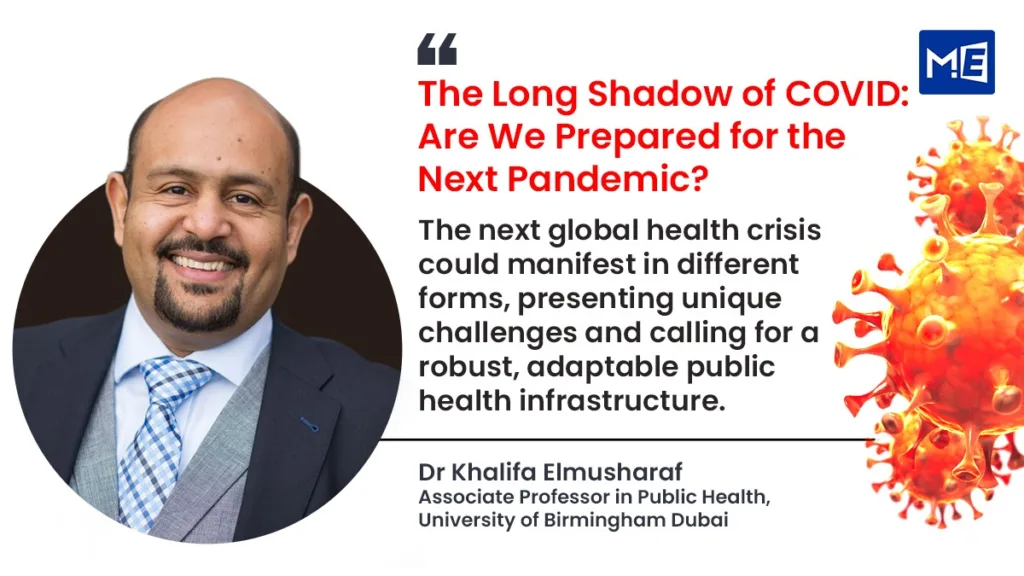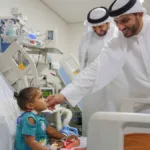COVID-19 was a reminder of how interconnected and vulnerable our world is. Despite advancements in medical science and technology, the pandemic highlighted deficiencies in global health systems, supply chains, and emergency preparedness. Initial responses were associated with confusion, misinformation, and a lack of coordinated effort, underscoring the need for robust and adaptable frameworks for future crises.
The pandemic cast an undeniably long shadow across the globe, affecting every aspect of human life from health to the economy, education to social norms. As we begin to emerge from its grip, the pressing question remains: Are we prepared for the next pandemic?
The next global health crisis could manifest in different forms, presenting unique challenges and calling for a robust, adaptable public health infrastructure. The Middle East and North Africa (MENA) region, with its unique geopolitical and socioeconomic landscape, offers a crucial case study in understanding how different countries can bolster their defences against future health threats. The MENA region presents a diverse spectrum of medical preparedness levels, shaped by varying economic capacities and healthcare infrastructure.
Early Detection and Response: The First Line of Defense
Effective early detection and response mechanisms are the cornerstone of public health security. These mechanisms encompass strategies, protocols, and systems designed to promptly identify, assess, and respond to potential health threats. In the MENA region, there are significant variations in the robustness of these systems. High-income countries like the UAE have invested heavily in advanced surveillance technologies and laboratory capacities. These investments have facilitated the establishment of sophisticated early warning systems capable of detecting outbreaks swiftly.
The UAE’s commitment to regional cooperation in disease surveillance and response is exemplified by its implementation of advanced health monitoring systems. Such initiatives are critical in fostering a collaborative approach to health security, ensuring that countries are not working in isolation but as part of a cohesive regional network.
The COVID-19 pandemic highlighted the importance of having well-coordinated, comprehensive strategies in place. UAE demonstrated advanced preparedness through substantial investments in healthcare infrastructure and the development of detailed emergency plans. During the COVID-19 pandemic, the UAE exhibited proactive measures, including extensive testing, contact tracing, and robust public health campaigns. These efforts were augmented by clear communication strategies and substantial resource allocation, ensuring a rapid and effective response to the pandemic.
Furthermore, the UAE accelerated collaboration with international organizations and higher-income countries to unlock the necessary support to build resilient healthcare systems. Similarly, effective governance and policy coordination are fundamental for public health security.
Public Education and Awareness: Empowering Communities
Public education and awareness campaigns are cornerstones for public health security, as empowering communities through education and active involvement in public health initiatives is crucial for building trust and ensuring compliance with health directives
During the COVID-19 pandemic, the rapid spread of misinformation posed significant challenges to public health efforts, leading to widespread confusion and fear. False claims about the virus’s origins, transmission methods, and treatments proliferated on social media and other platforms, often overshadowing factual information. This misinformation led to dangerous behaviours, such as rejecting vaccinations, ignoring public health guidelines, and resorting to unproven and sometimes harmful remedies.
Addressing these challenges required robust public education campaigns that not only provided accurate information but also actively debunked myths, engaged with community leaders to reinforce credible messages, and utilized technology to track and counteract misinformation in real-time.
Safeguarding Public Health
As part of our mission at the University of Birmingham Dubai, our programme not only educates future public health leaders but also actively participates in critical policy discussions, ensuring our students are exposed to real-world challenges and solutions.
On the 30th of May 2024, I had the privilege, as the Director of Public Health Programmes at the University of Birmingham Dubai, of moderating a Policy Panel on “Safeguarding Public Health in the UAE Against Future Pandemics.” This insightful discussion featured distinguished panellists, including Dr. Mahra Khalifa AlHosani, Section Head of Preparedness and Response in the Communicable Disease Sector at the Abu Dhabi Public Health Center; Dr. Imane Boudellioua, Senior Researcher at the Biotechnology Research Center, Technology Innovation Institute, Abu Dhabi; and Dr. Ahmed Al Hammadi, President of the Emirates Infectious Diseases Society. The panel explored strategies for enhancing public health preparedness by reflecting on the lessons from the COVID-19 pandemic and discussing innovative approaches to strengthen the UAE’s healthcare infrastructure.
Also Read: COVID Booster Shots: A Shield for the Vulnerable?
The discussion highlighted the importance of integrated efforts across government, healthcare, and technology sectors, underscoring successful investments in health surveillance and public education. Advanced biotechnology and continuous research and development were identified as crucial for early detection and rapid response. Additionally, the panel stressed the need for strong governance, comprehensive emergency response plans, and robust community engagement to build a resilient health system. Collectively, these insights underscored the UAE’s commitment to leveraging technology, fostering collaboration, and engaging communities to enhance public health security.
Building a Resilient Public Health Future
In the end, the critical question for the UAE is not just about its preparedness for the next pandemic, but about its dedication as a government, healthcare professionals, researchers, and industry to fostering a coordinated, inclusive approach that strengthens national public health security and sets a benchmark for the region and the world.
A resilient public health infrastructure is not just about having the right tools and technologies; it’s about fostering a culture of cooperation, trust, and shared responsibility. By learning from the challenges and successes of the COVID-19 response, the MENA region can build a more robust and resilient public health framework, ready to face whatever health crises the future may hold.
As we move forward, it is essential to build on the lessons learned and continue to innovate and collaborate. The UAE’s proactive measures and strategic investments serve as a model for other countries aiming to enhance their public health security.

Public health programs, like ours at the University of Birmingham Dubai, along with other programmes in the UAE, play a crucial role in this endeavour by educating future public health leaders, engaging in critical policy discussions, and fostering a culture of cooperation and innovation. These programmes are vital in developing the knowledge and skills necessary to tackle global health challenges and ensure a resilient public health framework for the future.



















